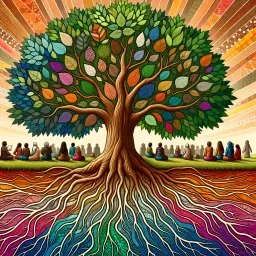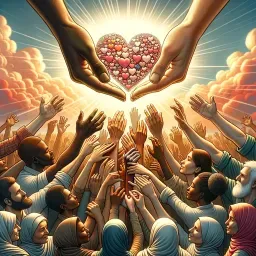It is in giving that we receive

1
0
0
0
- Meaning
- The meaning of "It is in giving that we receive" can be analyzed through a philosophical and psychological approach. It implies that the act of giving not only benefits the receiver but also the giver, fostering a sense of fulfillment and connection with others. This idea invites us to consider giving as a fundamental element of social life, where interpersonal relationships thrive on mutual generosity. The phrase encourages reflection on the interconnected nature of humanity and the satisfaction derived from helping others.
- Allegory
- In the allegorical image, the smiling person sharing represents joy and warmth; the gift symbolizes the act of giving, while the joined hands or the tree with roots represent the interconnectedness of people within the community. The warm colors convey a feeling of happiness and love, symbolizing how giving can lead to deeper bonds and satisfaction.
- Applicability
- The meaning of this phrase is applicable in daily life in various ways. It can encourage altruistic behaviors, such as volunteering, supporting local communities, or simply small acts of kindness towards friends and acquaintances. In a broader context, it embodies the idea that relationships, whether personal or professional, grow and flourish when one is willing to share and collaborate.
- Impact
- The impact of the phrase is significant, as it has inspired a variety of philanthropic and community movements. It is often cited in contexts of volunteering and counseling practices, reflecting a core principle of many non-profit organizations and charitable acts.
- Historical Context
- The historical context of the phrase is difficult to pinpoint precisely, as the idea of giving as a means to receive is an ideal present in many cultures since ancient times. It may be related to the teachings of various ethical philosophies, including Stoic philosophy and religious traditions, which encourage the values of altruism and community.
- Criticisms
- While generally well-received, there are discussions on how the concept of giving can sometimes be manipulative, with some arguing that not all gifts are selfless. These critiques raise questions about how society values altruistic gestures.
- Variations
- Variations of this phrase exist in different cultures, such as in Buddhism, where it is stated that compassion and the act of helping are essential to happiness. Other peoples, like those of the Ubuntu philosophy in Africa, emphasize that "I am because we are," a clear call to the importance of community and sharing.
-

I am part of all that I have found on my path.
-

Rarely falls who walks well.
-

If the goal to achieve is happiness, the journey is always worthwhile.
-

Only a life lived for others is a life worthwhile.
-

Some travel to lose themselves, some travel to find themselves.
-

Reality is merely an illusion, albeit a very persistent one.
-

The meaning of our life is the journey, not the destination. Because every answer is fallacious, every satisfaction slips through our fingers, and the destination is no longer such once it has been reached.
-

Sometimes, the smallest things take up the most room in your heart.
-

You can’t marry a man you just met.
No Comments